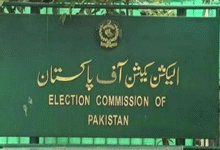JFHR and WJA Join Forces to Empower Female Journalists

In a significant step towards enhancing the role of female journalists in investigative reporting and promoting transparency, Journalism for Human Rights (JFHR) and the Women Journalists Association of Pakistan (WJA-Pakistan) officially signed a Memorandum of Understanding (MOU) at the National Press Club. The ceremony marked a collaborative effort to empower and build the capacity of women journalists in effectively practicing Right to Information Laws.
Representatives from both organizations, Saddia Mazhar, Executive Director, Journalism for Human Rights and Fouzia Kalsoom Rana, President, Women Journalists Association of Pakistan, inked the MOU in the presence of notable female journalists, including Senior Journalist Ismat Jabeen.
The MOU outlines several key areas of cooperation between the two organizations, aimed at enhancing the capacity building of female journalists in practicing Right to Information (RTI) laws for investigative journalism. Among the agreed-upon points are:
Guidelines on RTI Laws: JFHR will provide guidelines to the members of WJA-Pakistan, offering insights into the effective utilization of Right to Information laws for public interest investigative reporting.
Assistance in Drafting RTI Requests: JFHR commits to assisting and guiding WJA-Pakistan members in the skillful drafting of Right to Information requests, particularly concerning issues of public interest.
Publication Support: JFHR will extend its support in publishing public interest investigative reports by members of WJA-Pakistan. The reports will find a platform on “The Reporters (www.thereporters.pk),” “Journalism for Human Rights (www.jfhr.pk),” and other partner media organizations.
Coordination with Information Commissions: JFHR will play a facilitating role by coordinating with the Information Commissions in Islamabad, Punjab, Sindh, and Khyber Pakhtunkhwa. This coordination aims to arrange visits for members of WJA-Pakistan to the Information Commission, providing them with valuable exposure and insights into the workings of these institutions.
In a statement following the signing of the Memorandum of Understanding, Saddia Mazhar, Executive Director, Journalism for Human Rights, emphasized the paramount importance of Right to Information (RTI) laws for investigative journalism. She highlighted the significance of having access to authentic documents held by government and public bodies as a crucial tool in unveiling the truth and ensuring transparency in reporting.
She further added, “The collaboration between Journalism for Human Rights and the Women Journalists Association of Pakistan signifies a commitment to enhancing the capacity of female journalists in utilizing RTI laws for investigative reporting. We believe that fostering this skill set among women journalists will contribute to a more informed and transparent society.”
Fouzia Kalsoom Rana, President, Women Journalists Association of Pakistan, said this collaboration marks a crucial step in empowering female journalists to navigate the complexities of investigative reporting, fostering a conducive environment for the promotion of transparency and accountability in Pakistan’s media landscape. As both organizations come together, they are set to create a meaningful impact on the journalism sector, encouraging more women to actively participate and excel in the field of investigative journalism.






